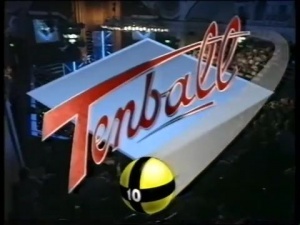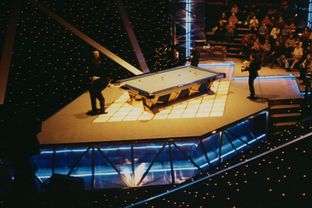Tenball
(→Synopsis: tidied up regarding Tenball's two major differences from standard snooker, plus the special rules aimed at speeding things up; also further explained why 200 was the maximum break) |
(→Co-hosts) |
||
| (One intermediate revision not shown) | |||
| Line 6: | Line 6: | ||
[[Phillip Schofield]] | [[Phillip Schofield]] | ||
| + | |||
| + | == Co-hosts == | ||
| + | |||
| + | Commentator: Chris Carter | ||
| + | |||
| + | Referee: Martin Webb | ||
| + | |||
| + | Scorer: Keith Weston | ||
== Broadcast == | == Broadcast == | ||
Current revision as of 11:33, 26 July 2020
Contents |
Host
Co-hosts
Commentator: Chris Carter
Referee: Martin Webb
Scorer: Keith Weston
Broadcast
LWT for ITV, 8 April to 20 May 1995 (7 episodes in 1 series)
Synopsis
This was meant to be a stunning new sport wasn't it? So good in fact that after work or down the pub on Fridays... we still play pool. Classy.
Still, let's give this a chance. After all, if Phillip Schofield can act with a load of wooden animals on stage, working with this load of balls should be no problem.
Two professional snooker players would square up against each other. The first major difference from standard snooker was the presence of the yellow and black "Tenball", which was worth (get this!) ten points, and was obviously the crowning glory. It was placed in the middle of the table, surrounded by 15 reds in a diamond configuration. The second major difference was that in each break, the first colour the player potted after potting a red determined the points value of all the colours in that break (so if the "Tenball" was the first colour potted, all the colours in that break would be worth ten points). With the colours being potted in sequence for their original points values after the final red was potted, the maximum break was precisely 200.
There were also various special rules aimed at speeding up the game. These included at least one ball having to hit a cushion or be potted on every stroke, balls not being returned to their previous positions after a foul, and balls only being cleaned if something actually got stuck to them (unlike standard snooker, a mere accumulation of chalk dust didn't count).
OK, so it was essentially snooker, but it was presented quite nicely, there being a spacey-futuristic set which looked as if it was hanging down from the suspended audience stalls. We were also treated to various fun facts such as the speed of the break so you too could wow at the fact that Alex Higgins whacked a ball at 18 mph.
Pretentious as hell then, but its heart was vaguely in the correct place.
Inventor
Russ Lindsay and Peter Powell, with Barry Hearn and Steve Davis.
Trivia
Ronnie O'Sullivan achieved the maximum 200 break while practising with Steve Davis.
Jimmy White won the series, beating Ronnie in the final. The tournament high break was Peter Ebdon's 122.
Many ITV regions declined to show the series, and it was only shown in the LWT, Granada, Central, Yorkshire, Tyne Tees and Border regions.
Merchandise
Web links
Andy Walmsley's "space age" set design
See also
Weaver's Week review (2018)



